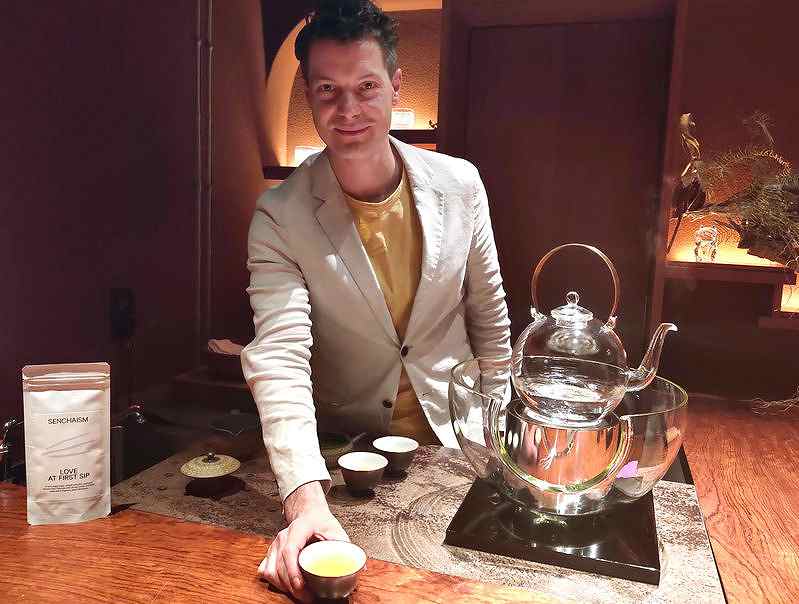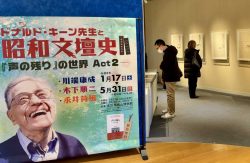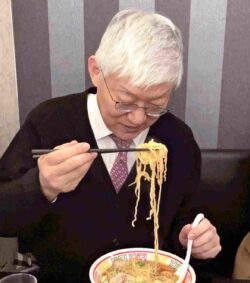
Oscar Brekell serves a cup of tea brewed with leaves from his own Japanese tea brand, Senchaism, at a tea room of his favorite matcha shop Ippuku & Matcha in Chuo Ward, Tokyo, on March 26.
12:56 JST, May 9, 2021
It’s about time for the first harvest of Japanese green tea across the nation. For one young Swede, shincha, or new tea, is what he “looks forward to more than anything else” every year.
Since 2016, Oscar Brekell has made an annual pilgrimage to the fields of Mariko, Shizuoka City, to harvest his favorite tea leaves by hand.
A Japanese tea instructor, Brekell related that the ritual “never fails to remind me of why I relocated to Japan and fills me with optimism about the future.”
The hills of Mariko are a long way from Malmo, Sweden, where Brekell tried Japanese green tea for the first time as a third-year student in high school.
After a discussion of Japan in history class, Brekell decided to learn more about the country and found his way to a copy of “The Book of Tea,” a meditation on tea ceremony aesthetics penned by philosopher and art scholar Tenshin Okakura (1863-1913).
But when Brekell finally took his first covetous mouthful of Japanese tea, he found it was quite different from what he had imagined.
“It wasn’t a romantic, love at first ‘sip’ experience,” he said in fluent Japanese. “It was so astringent and bitter and tasted like grass.”
Nevertheless, not wanting to let the expensive imported tea go to waste, he decided to give it another chance.
Over time, Brekell came to realize that “green tea is an acquired taste,” and his initial misgivings blossomed into an insatiable obsession that convinced him to major in Japanese and move to Japan.
Upon arriving in Japan, he was surprised to find that the nation’s tea had largely been usurped by trendy coffee shops. “Like many foreign tourists would, I had expected to find an abundance of Japanese tea stands and tea rooms in Japan, but the reality was that there were few.”
Although oolong tea always seemed to be available at restaurants and izakaya pubs, a good cup of Japanese tea was surprisingly hard to come by.
“Restaurants in Japan offer a wide spectrum of cuisines. I think many Japanese people are true foodies with a passion for all things delicious. I’m often asked what food goes well with various kinds of Japanese tea leaves, but I’d say that Japanese tea itself is like a full-course meal because it’s full of umami, sweet, astringent and bitter flavors. It’s a pity that people aren’t able to enjoy quality green tea when they’re out to eat,” said Brekell.
Pouring cups of tea brewed with leaves from Senchaism, his own tea brand, Brekell elaborated on the dilemma:
“Japanese tea is almost too ingrained in Japanese culture, to the point where, ironically, it seems there are few Japanese who truly know quality Japanese tea and are able to enjoy it to their heart’s content in terms of various tea leaves and teaware.”
Brekell added: “Many Japanese people drink bottled green tea today. It’s convenient, but it’s not the same as the tea brewed in a teapot.”
Brekell is on a mission to help revive an appreciation of tea and exquisite teaware to modern audiences, enlisting the help of some distinctly modern solutions.
Conscious of reviving tea’s image, Brekell is strategic about the photos he uploads on his official website and social media, as “poorly taken photos can make tea look cheap.”
Perusing photos of him online, one can see how he has taken this commitment to image to impressive lengths. Even when tramping around tea plantations, Brekell is often seen wearing crisp dress shirts.
Unfortunately for his fans, the pandemic has put most of his public events on the back burner. But Brekell remains optimistic and said the challenges of the past year have compelled him to search out new ways to promote tea.
For example, he recently held an online seminar for green tea experts living around the world, shipping Japanese tea kits for professional use beforehand to 30 participants in 12 countries, from the United States to Italy and Finland. Out of consideration for the time zones of the seminar participants, he started the caffeinated seminar at 1 a.m. Japan time.
And of course, it would take more than a pandemic to make Brekell miss the first harvest.
Brekell went to Shizuoka Prefecture in mid-April, where he plans to stay until late May.
“I hope to spend the time making online videos of beautiful tea plantations, capturing the process of tea production and visiting other tea-related sites in the prefecture to help viewers feel as if they were there.”
Through his efforts, Brekell hopes to provide a spark that helps people become interested in and rethink Japanese tea.
When asked for recommendations on how to make the most of teatime while staying at home during the pandemic, Brekell said: “Japanese tea is an ideal drink to make this downtime a little bit better. It’s easy to prepare — basically, all you need are a teapot and tea leaves. Some people might tell you it’s difficult to steep tea properly, but honestly, it’s something anyone can enjoy, once you’ve learned a few basic steps.”

Oscar Brekell
Certified Japanese tea instructor
Born in Malmo, Sweden, in 1985. After developing a taste for Japanese tea, Brekell decided to major in Japanese language studies at Lund University in Sweden, participating in a yearlong study abroad program at Gifu University in 2010. Eager to return to Japan, he took a sales job with a Japanese company in 2013, all the while working toward his dream of one day introducing fine Japanese tea in his native Sweden.
Brekell became an accredited Japanese Tea Instructor in 2014. After completing an internship at the Tea Research Center in Shizuoka Prefecture, he joined the Japan Tea Export Promotion Council in 2016. Since launching his own tea business in 2018, Brekell has been an active voice for tea culture and education in Japan and abroad.
Brekell is also the author of several books on tea, including “The Book of Japanese Tea,” which was published in a bilingual Japanese-English edition by Tankosha Publishing Co.
Top Articles in JN Specialities
-

Tokyo University of the Arts Now Offering Free Guided Tour of New Storage Building, Completed in 2024
-

Exhibition Shows Keene’s Interactions with Showa-Era Writers in Tokyo, Features Newspaper Columns, Related Materials
-

The Japan News / Weekly Edition (1/30-2/5)
-

Step Back in Time at Historical Estate Renovated into a Commercial Complex in Tokyo
-

Prevent Accidents When Removing Snow from Roofs; Always Use Proper Gear and Follow Safety Precautions
JN ACCESS RANKING
-

Japan PM Takaichi’s Cabinet Resigns en Masse
-

Japan Institute to Use Domestic Commercial Optical Lattice Clock to Set Japan Standard Time
-

Israeli Ambassador to Japan Speaks about Japan’s Role in the Reconstruction of Gaza
-

Man Infected with Measles Reportedly Dined at Restaurant in Tokyo Station
-

Videos Plagiarized, Reposted with False Subtitles Claiming ‘Ryukyu Belongs to China’; Anti-China False Information Also Posted in Japan























